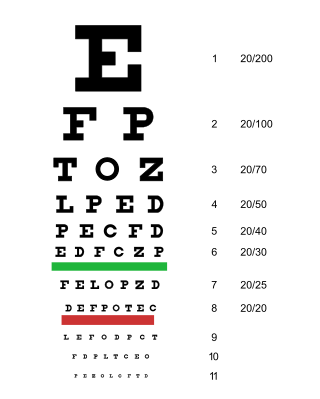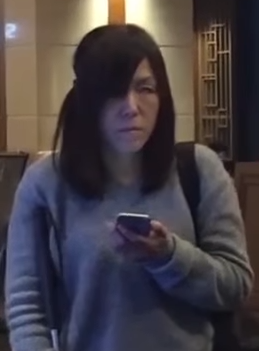Related Research Articles
The American Foundation for the Blind (AFB) is an American non-profit organization for people with vision loss. AFB's objectives include conducting research to advance change, promoting knowledge and understanding, and shaping policies and practices.

Visual or vision impairment is the partial or total inability of visual perception. In the absence of treatment such as corrective eyewear, assistive devices, and medical treatment, visual impairment may cause the individual difficulties with normal daily tasks, including reading and walking. The terms low vision and blindness are often used for levels of impairment which are difficult or impossible to correct and significantly impact daily life. In addition to the various permanent conditions, fleeting temporary vision impairment, amaurosis fugax, may occur, and may indicate serious medical problems.

Vivian Berkeley is a Canadian two-time World Blind Lawn Bowling Champion,1996 Paralympic Games Silver Medalist and 2002 Commonwealth Games Bronze Medalist.
Blind artists are people who are physically unable to see normally, yet work in the visual arts. This seeming contradiction is overcome when one understands that only around 10% of all people with blindness can see absolutely nothing at all. As such most blind people can in fact perceive some level of light and form, and it is by applying this limited vision that many blind artists create intelligible art. Also, a blind person may once have been fully sighted and yet simply lost part of their vision through injury or illness. Blind artists are able to offer insight into the study of blindness and the ways in which art can be perceived by the blind, in order to better improve art education for the visually impaired.

The Lighthouse of Houston is a private, non-profit education and service center dedicated to assisting blind and visually impaired people in the Houston, Texas, United States metropolitan area to live independently. The Lighthouse serves approximately 9,000 people each year and is a member agency of the United Way of Greater Houston.
The Cleveland Sight Center (CSC) is a non-profit organization that provides services to individuals who are blind or visually impaired. CSC’s mission is to provide individualized support and tools to navigate the visual world. Founded in 1906, it is accredited by the Commission on Accreditation of Rehabilitation Facilities (CARF) and serves thousands of individuals annually in Northeast Ohio.
Narrative Television Network (NTN) makes movies, television shows and educational programming accessible to millions of blind and visually impaired people and their families. Founded in 1988 by Jim Stovall, the Narrative Television Network unobtrusively adds the voice of a narrator to the existing program between the dialogue so that blind or low vision people can hear what they can't see. The Narrative Television Network has received an Emmy Award, a Media Access Award and an International Film and Video Award for its pioneering work in making movies, television and educational programming accessible for the visually impaired. The Narrative Television Network website offers readers a “Text Only” version of its pages to increase accessibility for blind and visually impaired readers who use screen readers.

Lighthouse Guild is an American charitable organization, based in New York City, devoted to vision rehabilitation and advocacy for the blind. Its mission statement is "To overcome vision impairment for people of all ages through worldwide leadership in rehabilitation services, education, research, prevention and advocacy."

Christine Huyền Trân Hà is an American chef, writer and TV host. She is the first blind contestant of MasterChef and the winner of its third season in 2012.
Columbia Lighthouse for the Blind (CLB) is an organization founded to help the blind or visually impaired population of the greater Washington, D.C., region, including the deafblind community, deal with the challenges of vision loss. The goal of CLB is to try to help people who are blind or visually impaired to remain independent, active and productive in society.
The Council of Schools and Services for the Blind (COSB) is a consortium of specialized schools in Canada and the United States whose major goal is improving the quality of services to children who are blind and visually impaired.
Marcia Mitchell is the founder of Little Light House, a faith-based mission to assist children with a wide range of developmental disabilities including autism, Down syndrome, cerebral palsy. The program is not only a facility for students, but also serves as a training ground for professionals and volunteers throughout the United States and other countries who are learning to reach out to special needs children in their communities. Mitchell continues to serve as CEO of the Little Light House and published a book on her journey, Milestones and Miracles. Mitchell was inducted into the Oklahoma Women's Hall of Fame in 2011.
Father Thomas J. Carroll was a Catholic priest and a pioneer in treatment for people who became blind later in their lives,. He was also a leader in implementing liturgical renewal in the Catholic church after Vatican II and took an active part in the civil rights movement.

Chieko Asakawa is a blind Japanese computer scientist, known for her work at IBM Research – Tokyo in accessibility. A Netscape browser plug-in she developed, the IBM Home Page Reader, became the most widely used web-to-speech system available. She is the recipient of numerous industry and government awards.

Carla Dawn Qualtrough is a Canadian politician and former Paralympic swimmer who served as the Minister of Sport and Physical Activity from July 2023 to December 2024. A member of the Liberal Party, Qualtrough has represented the riding of Delta in the House of Commons since 2015.
Natalie Carter Barraga was an American educator and researcher who studied visual impairment, recognized for contributions to the education of children with low vision.
Anne Lesley Corn is an American educator, author, researcher, and advocate for those with low vision or blindness. Corn herself has low vision—she is legally blind—and her personal experience has informed and inspired her research and advocacy.

Roberta Anna Griffith was an American journalist and community leader, active in the American Foundation for the Blind and founder of the Grand Rapids Association of the Blind and Visually Impaired.
Ruth Kaarlela was an American university professor and social worker. Her work was in the fields of blindness, gerontology, and vision rehabilitation therapy.
References
- 1 2 3 "Advocate for blind earns spot in Texas Women's Hall of Fame". The Dallas Morning News. 8 September 2010. Retrieved 2022-05-08.
- 1 2 3 "Judy Scott, Long-Time Vision Loss Champion, to Retire from AFB". American Foundation for the Blind. 5 August 2015. Retrieved 2022-05-07.
- 1 2 3 "Judy Castle Scott". Texas Woman's University. 9 October 2019. Retrieved 2022-05-08.
- ↑ "Disability History and Awareness Month: Judy Scott, Texas Women's Hall of Fame" (Press release). Office of the Governor Texas. 26 October 2012. Retrieved 2022-05-08.
- ↑ "Distinguished Alumni". Texas A&M University-Commerce. 9 June 2011. Retrieved 2022-05-07.
- ↑ "Awards". American Council of the Blind of Texas. Retrieved 2022-05-08.